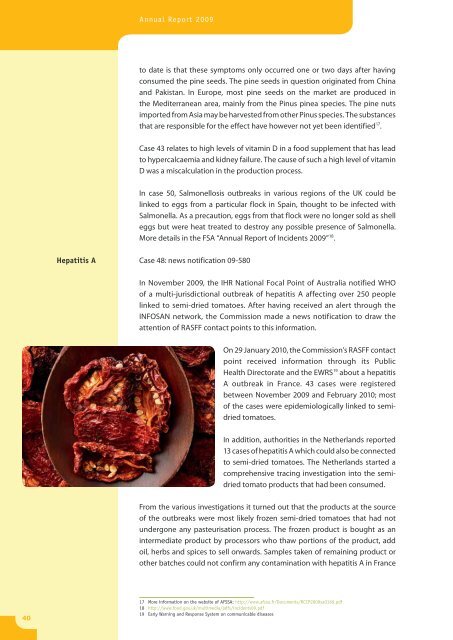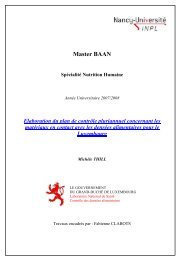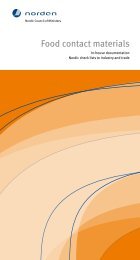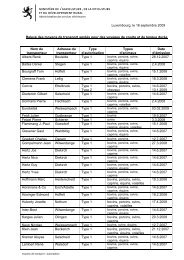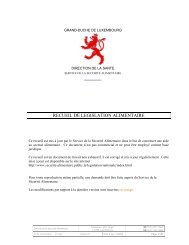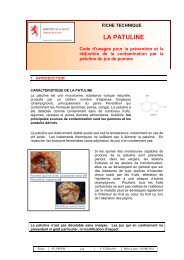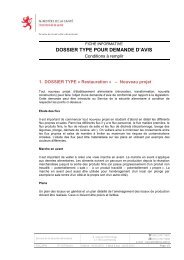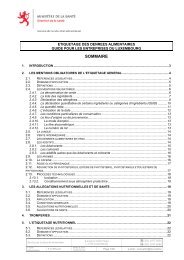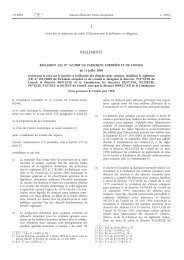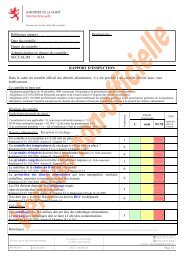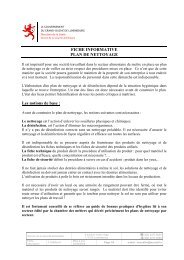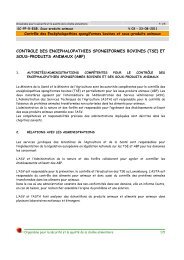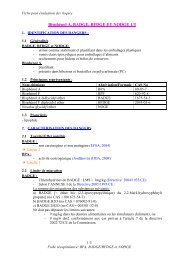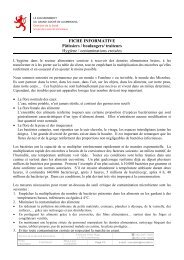(RASFF) Annual Report 2009 - European Commission - Europa
(RASFF) Annual Report 2009 - European Commission - Europa
(RASFF) Annual Report 2009 - European Commission - Europa
Create successful ePaper yourself
Turn your PDF publications into a flip-book with our unique Google optimized e-Paper software.
<strong>Annual</strong> <strong>Report</strong> <strong>2009</strong><br />
to date is that these symptoms only occurred one or two days after having<br />
consumed the pine seeds. The pine seeds in question originated from China<br />
and Pakistan. In Europe, most pine seeds on the market are produced in<br />
the Mediterranean area, mainly from the Pinus pinea species. The pine nuts<br />
imported from Asia may be harvested from other Pinus species. The substances<br />
that are responsible for the effect have however not yet been identified 17 .<br />
Case 43 relates to high levels of vitamin D in a food supplement that has lead<br />
to hypercalcaemia and kidney failure. The cause of such a high level of vitamin<br />
D was a miscalculation in the production process.<br />
In case 50, Salmonellosis outbreaks in various regions of the UK could be<br />
linked to eggs from a particular flock in Spain, thought to be infected with<br />
Salmonella. As a precaution, eggs from that flock were no longer sold as shell<br />
eggs but were heat treated to destroy any possible presence of Salmonella.<br />
More details in the FSA “<strong>Annual</strong> <strong>Report</strong> of Incidents <strong>2009</strong>” 18 .<br />
Hepatitis A<br />
Case 48: news notification 09-580<br />
In November <strong>2009</strong>, the IHR National Focal Point of Australia notified WHO<br />
of a multi-jurisdictional outbreak of hepatitis A affecting over 250 people<br />
linked to semi-dried tomatoes. After having received an alert through the<br />
INFOSAN network, the <strong>Commission</strong> made a news notification to draw the<br />
attention of <strong>RASFF</strong> contact points to this information.<br />
On 29 January 2010, the <strong>Commission</strong>’s <strong>RASFF</strong> contact<br />
point received information through its Public<br />
Health Directorate and the EWRS 19 about a hepatitis<br />
A outbreak in France. 43 cases were registered<br />
between November <strong>2009</strong> and February 2010; most<br />
of the cases were epidemiologically linked to semidried<br />
tomatoes.<br />
In addition, authorities in the Netherlands reported<br />
13 cases of hepatitis A which could also be connected<br />
to semi-dried tomatoes. The Netherlands started a<br />
comprehensive tracing investigation into the semidried<br />
tomato products that had been consumed.<br />
From the various investigations it turned out that the products at the source<br />
of the outbreaks were most likely frozen semi-dried tomatoes that had not<br />
undergone any pasteurisation process. The frozen product is bought as an<br />
intermediate product by processors who thaw portions of the product, add<br />
oil, herbs and spices to sell onwards. Samples taken of remaining product or<br />
other batches could not confirm any contamination with hepatitis A in France<br />
40<br />
17 More information on the website of AFSSA: http://www.afssa.fr/Documents/RCCP<strong>2009</strong>sa0166.pdf<br />
18 http://www.food.gov.uk/multimedia/pdfs/incidents09.pdf<br />
19 Early Warning and Response System on communicable diseases


